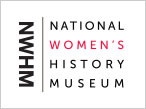Join the Legacy Society
Leave a legacy in American history, one that will ensure women's many achievements and contributions are recognized. The Legacy Society was created to acknowledge those who have made a commitment to the future of the Museum by including the Museum in their estate plans. With permission, Legacy Society members are acknowledged in Museum publications, such as the annual report, and receive invitations to our annual and regional events.
By joining the Legacy Society, your far-reaching gifts will enable the Museum to inform and inspire women around our nation for generations to come.
The Museum accepts gifts of cash, appreciated securities, and other assets including stock, life insurance, retirement assets, and real estate. If you have questions about joining the Legacy Society, contact us at 703-461-1920 or development@nwhm.org.
Legacy Society Members

Bequest
Making a bequest through a will or a living trust makes a statement about what matters most in your life, and ensures that your intentions will be followed by those administering your estate. You may designate a specific dollar amount, percentage of the remaining estate, or make a beneficiary designation of certain assets to the Museum. Besides listing the Museum in your will, you may also sign a memorandum of agreement that specifies how your gift is to be used. See the official bequest language for the National Women's History Museum here.
Retirement Plan Assets or Insurance Policies
If left in your estate, retirement assets are subject to income as well as possible estate taxes. This makes them a poor asset to pass on to loved ones, but an excellent asset to use for a charitable estate gift. Using the "beneficiary designation" for your qualified retirement plan account or IRA, you can use excess retirement funds to make a convenient and cost-effective charitable gift to the Museum after providing for yourself and your family.
Charitable Remainder Annuity Trusts
The Charitable Remainder Trust is similar to other types of trusts except that it has a charitable beneficiary. A grantor transfers property irrevocably to a trust and specifies how trust income and principal are to be distributed, and the Charitable Remainder Annuity Trust provides one or more individuals with fixed annual income for life. The trust may be created to become effective during life or at death, and is an ideal arrangement for donors who do not want their income stream tied to market performance. Gifts for Charitable Remainder Trusts typically start at the $100,000 level and require a legal agreement.
Charitable Remainder Unitrust
The primary features of the Charitable Remainder Unitrust are that it provides for the payment to the income beneficiary in an amount that may vary. The payment must equal a fixed percentage of the net fair market value of the trust assets valued annually. The grantor determines the fixed percentage of at least 5 % upon creation of the Charitable Remainder Unitrust.
Charitable Lead Trusts
A Charitable Lead Trust allows you to provide for a sequence of annual gift payments to the Museum and then have the assets transferred to your family at a set time in the future. This device reduces gift or estate taxes. A Charitable Lead Trust requires you to provide an annual gift to the Museum for a term of years with a minimum gift of $100,000.
Charitable Gift Annuities
A Charitable Gift Annuity is one of the easiest and most popular ways to make a charitable gift. A Charitable Gift Annuity is a contract between a donor and the Museum in which the donor makes a gift to the Museum which pays a fixed annual amount to you and/or another beneficiary. Charitable Gift Annuities require a minimum gift of $10,000.
Endowment
When considering a gift to the Museum, you may want to designate your gift for an endowed fund in your name or in memory of a loved one. The principal of an endowment gift is invested and the income is used as an enduring source of support. In this way, an endowment can dramatically increase the value of your contributions. A minimum gift of $50,000 establishes a permanent fund for the Museum, and a minimum of $350,000 allows you to name a permanent fund.
As a 501(c) 3 nonprofit organization, all gifts to the Museum are tax deductible to the full extent of the law.
